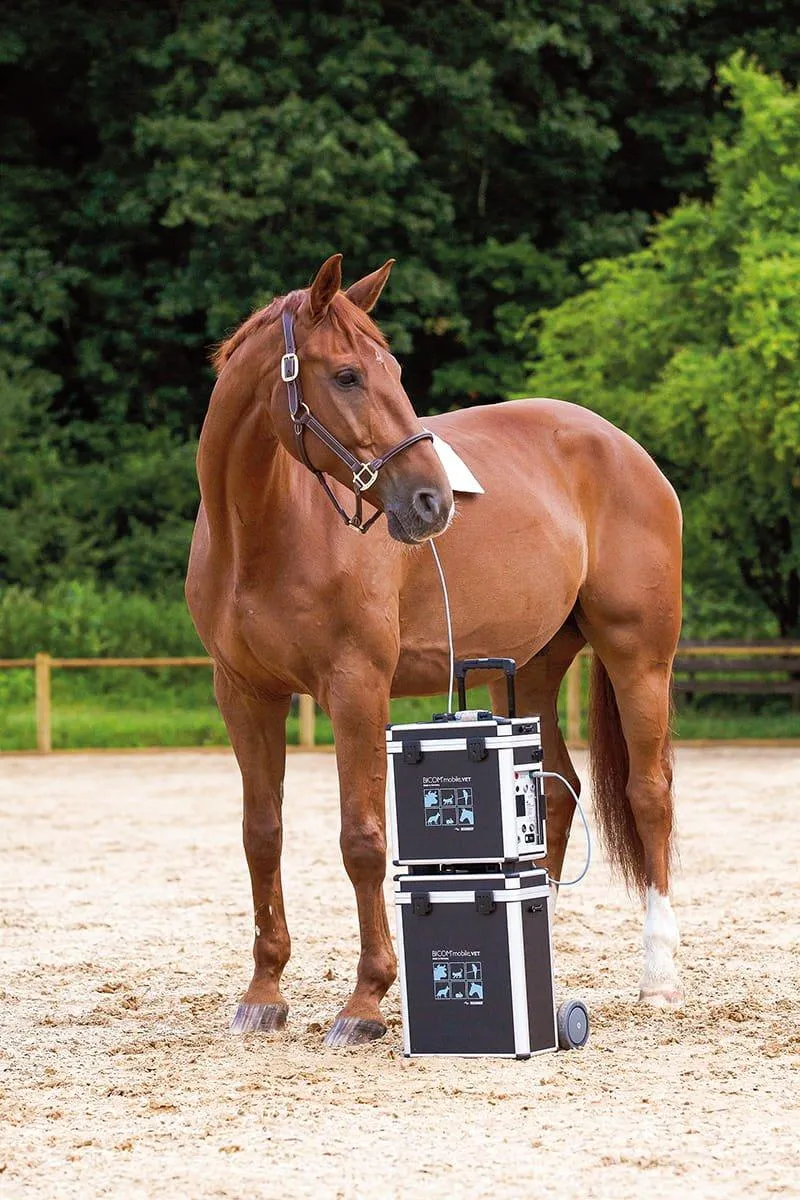Welcome to our veterinary page!
in this section, you can discover what bioresonance therapy is and how it can be a useful tool to enhance your veterinary practice.
Bioresonance therapy is an alternative treatment method that uses electromagnetic frequencies to address imbalances in the body. When applied to animals, it can help to alleviate a range of health conditions by promoting natural healing processes. This non-invasive therapy is gaining popularity among pet owners who are looking for safe and effective ways to support their animal’s well-being. Learn more about bioresonance therapy for animals and how it may benefit your furry friend.
Bioresonance has long been used to identify and target the root cause of a variety of health problems in people. More recently, this technology has also been applied to pets and other animals with much success. BICOM® bioresonance therapy can be used in the treatment of various types of animals, including, Dogs, Cats, Horses, Rodents, Birds and more.
Would you like to know more?
A range of experiences, research and scientific studies into the efficacy of bioresonance treatment can be found on our Blog section. This is where you can view the latest findings and articles about therapy with the BICOM® or browse the article archives.
You can also learn more about the features of the specific devices in the BICOM® range through our therapy machine page. This can help you to see which product will suit you, your clients and your practice best.

Expert Bioresonant Therapy for Insomnia Relief
How Bioresonant Therapy Can Help You Beat Insomnia and Sleep Like a Baby
If you're one of the millions of people struggling with insomnia, you're not alone. Sleepless nights can lead to frustration, anxiety, and even serious health issues. But what if there was a way to finally get the deep, restorative sleep you've been longing for? Bioresonant therapy might be the key to unlocking the restful nights you deserve.
This non-invasive therapy works with your body’s natural energy to address the underlying causes of insomnia. Let’s explore how it can help you sleep like a baby again.
Understanding Insomnia and Its Effects
Before we dive into how bioresonance therapy can help, it's essential to understand the impact of insomnia. Insomnia is more than just a few restless nights; it can disrupt your entire life.
What Is Insomnia?
Insomnia is the inability to fall asleep or stay asleep, affecting your overall sleep quality. Whether it's difficulty falling asleep, waking up too early, or waking up feeling unrefreshed, insomnia can take a toll on your body and mind.
The Impact of Poor Sleep
Chronic insomnia can lead to:
Increased stress and anxiety
Poor concentration and memory
Weakened immune system
Risk of developing chronic conditions such as high blood pressure, heart disease, and diabetes
The physical and emotional consequences can leave you feeling stuck in a cycle of fatigue. This is where bioresonance therapy comes in.
How Bioresonance Therapy Works for Insomnia
Bioresonance therapy is a holistic treatment method that uses energy to help the body heal. It works by identifying and correcting energetic imbalances in the body. By doing so, it can address the root causes of various health issues, including sleep disturbances like insomnia.
The Basics of Bioresonance Therapy
Bioresonance therapy is based on the concept that every cell in your body has a frequency. When your body is in balance, these frequencies work harmoniously. However, factors like stress, illness, or emotional trauma can cause disruptions in these frequencies, leading to health problems such as insomnia.
During a bioresonant session, the therapist uses a machine that detects and measures these imbalances. The device then sends corrective frequencies to help restore the body's natural balance. This can have a profound impact on improving sleep quality by targeting issues like stress, anxiety, or even physical discomfort that might be preventing restful sleep.
The Connection Between Energy and Sleep
Your body’s energy plays a significant role in how well you sleep. When your energy system is out of balance, it can affect your ability to fall asleep and stay asleep.
Stress and Anxiety: Common Sleep Disruptors
One of the primary reasons for poor sleep is stress. The pressures of daily life, work, relationships, and other responsibilities can keep your mind racing at night. This heightened state of alertness prevents your body from entering the relaxed state necessary for sleep.
Bioresonance therapy works by calming your nervous system and reducing the stress response in your body. This helps your body prepare for sleep naturally, without relying on medication or other artificial sleep aids.
Emotional and Mental Factors Affecting Sleep
In addition to physical stress, emotional and mental factors can also cause insomnia. Unresolved trauma, depression, and anxiety can keep your mind active and prevent deep, restorative sleep. Bioresonance therapy can help release emotional blockages and restore emotional balance, leading to improved sleep.
Benefits of Bioresonance Therapy for Insomnia
Bioresonance therapy offers several benefits when it comes to managing and overcoming insomnia. Here are some of the key advantages:
1. Non-Invasive and Drug-Free Solution
Unlike medications, which often come with side effects and the risk of dependency, bioresonance therapy is completely natural and non-invasive. It works by supporting your body’s own healing processes rather than masking symptoms with drugs.
2. Personalized Treatment
Every person’s body and energy system are unique. Bioresonance therapy is tailored to meet your specific needs, addressing the underlying causes of your insomnia. Whether it’s emotional stress, physical discomfort, or other factors, bioresonance can target the root cause and bring your body back into balance.
3. Improved Sleep Quality
Many people who undergo bioresonance therapy report better sleep quality. They fall asleep faster, stay asleep longer, and wake up feeling more rested and refreshed. Over time, this leads to a natural, lasting improvement in sleep patterns.
4. Reduced Stress and Anxiety
As bioresonance therapy helps to correct energetic imbalances, it also reduces stress and anxiety. This creates a peaceful, calm state that is conducive to falling asleep and staying asleep. With regular sessions, many people experience a significant reduction in stress levels.
What to Expect During a Bioresonance Therapy Session
If you're considering bioresonance therapy for insomnia, it's helpful to know what to expect during a session.
The Process
Initial Consultation: Your therapist will first discuss your symptoms and health history to understand the root cause of your insomnia.
Energy Testing: The bioresonance device will assess the frequencies in your body and identify any imbalances.
Frequency Adjustment: The therapist will use the device to send corrective frequencies to restore balance.
Follow-Up Sessions: Depending on your condition, you may need a series of sessions to achieve optimal results.
The sessions are usually relaxing, and many people find that they leave feeling calm and rejuvenated.
Combining Bioresonance Therapy with Other Sleep Solutions
While bioresonance therapy can be highly effective for insomnia, combining it with other healthy sleep practices can enhance your results. Consider these additional strategies to promote better sleep:
1. Sleep Hygiene
Maintaining good sleep hygiene is essential for improving sleep. This includes creating a consistent sleep schedule, avoiding screens before bedtime, and making your sleep environment comfortable.
2. Relaxation Techniques
Incorporating relaxation techniques, such as meditation, deep breathing exercises, or light yoga, can further reduce stress and prepare your body for sleep.
3. Dietary Adjustments
Certain foods and drinks can interfere with sleep. Caffeine, alcohol, and heavy meals late at night can disrupt your sleep cycle. Consider making dietary changes to support better sleep.
Success Stories: How Bioresonance Therapy Has Helped Others
Many people have experienced significant improvements in their sleep quality after using bioresonance therapy. Here are some real-life examples of how this therapy has helped people overcome insomnia:
Sarah, 42: “I struggled with insomnia for years. After just a few sessions of bioresonance therapy, I started falling asleep faster and waking up feeling rested. I can’t believe the difference it’s made!”
John, 55: “I’ve tried everything for my insomnia, but nothing worked until I tried bioresonance therapy. Now I sleep through the night and feel like a new person.”
Emily, 29: “The stress from work kept me up at night, but bioresonance therapy helped me release that tension and find peace. Now I sleep soundly every night.”
Conclusion
If you're tired of struggling with sleepless nights and want a natural solution to your insomnia, bioresonance therapy may be exactly what you need. Whether you’re dealing with stress, anxiety, or other sleep disruptors, this therapy can help restore balance and give you the deep, restful sleep you deserve. A bioresonant approach can offer a tailored solution to your sleep challenges, helping you finally achieve the quality rest you've been longing for.
Quick Links





Facebook
Instagram
Mail